
1 March 2016 Russia’s scientific community has been stirred another liberal reformers: the country’s only state Fund for Humanities — RGNF, decided to pour into the Russian RFBR Foundation funding for basic research. The corresponding order of the government was news to scientists that no one thought to consult. According to a member-correspondent of the Russian Academy of Sciences Askold Ivanchik, “Russian humanists, and the Fund itself, just put before the fact.” However, it has become a style of the Russian authorities — all key decisions are made narrow circle of “managers”, the opinion of the professional community cares about them in the least.
The concern of scientists due to the fact that in case of occurrence of RHF in the composition of the RFBR, the humanitarian agenda will be on the periphery of the Fund, whose main task is to promote the development of fundamental science. On assurances of authors of the reform, the merging funds will support research at the interdisciplinary crossroads. As stated in the government report States that “the decision aims to establish a unified procedure of access to grants for researchers regardless of research areas, reduce costs related to administering the funds under management funds”. However, scientists are concerned that a purely humanitarian work will not find in the new support structure. The joint structure of the Humanities is likely to be in the position of poor relatives.
Humanitarian Fund, of course, had no such funding, the Russian Foundation for basic research, but nevertheless, played a significant role in the support of Russian humanitarian science, the most vulnerable, from the point of view of justification of its practical benefits for the state. In the regions RHF grants were actually the only opportunity to raise funds for Humanities research projects, at the expense of the Fund were published monographs, conducted scientific conferences and symposia, the researchers paid visits to the archives. Now it is quite likely that when selecting projects for funding will prevail “interdisciplinary” criterion, i.e. the focus will be only a very narrow segment of the Humanities.
It should be noted that the government returns to the state of Affairs until 1994, when the Russian Foundation for basic research (founded in 1992) was the only public research collection in the country. Moreover, the need to allocate a separate structure for dealing with liberal studies, was recognized almost immediately, and soon established a humanitarian Foundation successfully worked for more than 20 years. Thanks to his support, were carried out over 40 research projects, conducted more than 2 thousand conferences, about 3 thousand expeditions, published more than 5 thousand scientific books.
More than 4 thousand people supported the petition to the Russian authorities with an appeal to save RHF as a “backbone for the development of humanitarian foundations of the consolidation of Russian society”. However, as practice shows, the chance that their voice will be heard by the authorities is minimal.
Why the government needed to eliminate so important for Russian science structure? Taking into account all previous experience of reforming of a science in our country, it is difficult to believe that the authorities are concerned, primarily, the development of interdisciplinary fields of science. Obviously, the real reason for the merger of the funds is the government’s desire to save on the support of the Humanities. RHF does not seem to eliminate completely, and a part of a larger organization, but this operation creates a cover for substantial cuts in funding for humanitarian projects. Not coincidentally, shortly before the decision to merge, there is information about the planned reduction of the budgets of research funds by 10%.
In modern Russia the development of human potential is deep on the periphery of state interests. It is not surprising that during the crisis the government perceives social Sciences and Humanities as a burden, and the decision on the elimination of humanitarian science Foundation indicates that from the path of liberal reform of science no one is going to stick. Unfortunately, within this paradigm, the coming years will be inevitable cuts in the budgets of the various research directions that will lead to a rapid loss of the intellectual potential of our country, so necessary for its modernization and strategic development.







